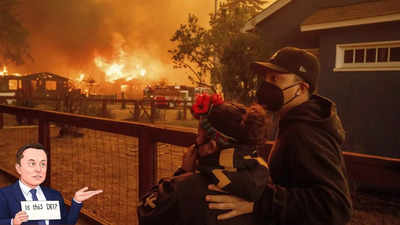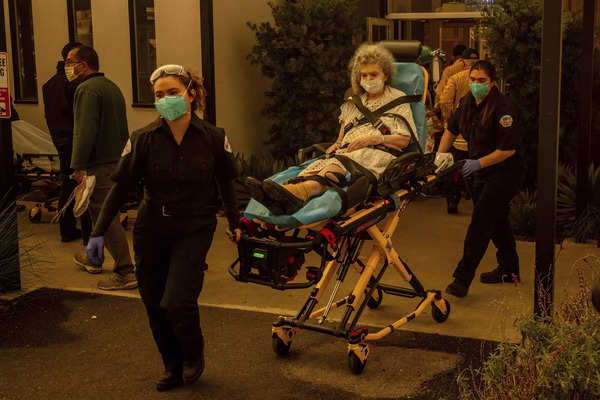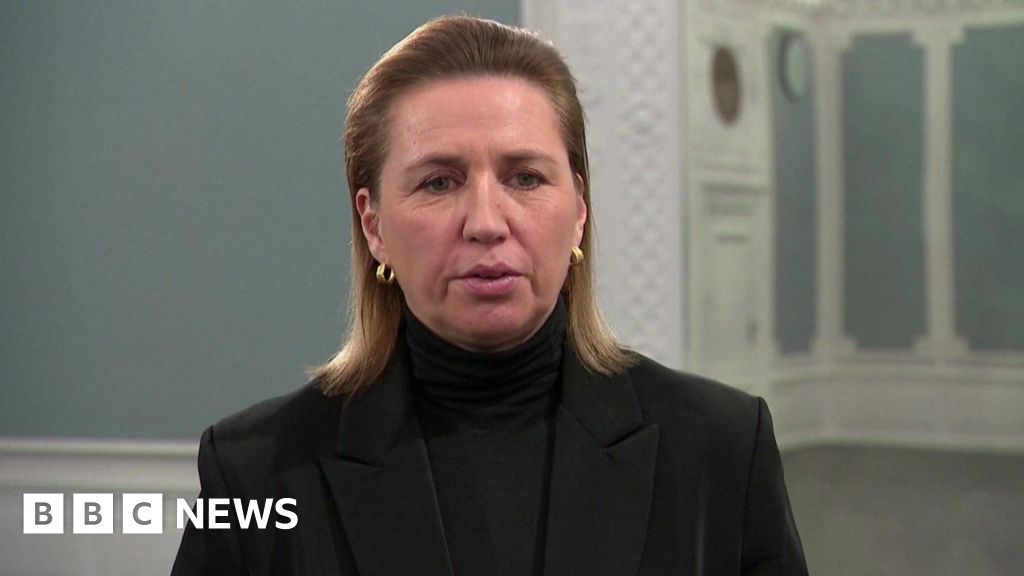
I and the public know what all schoolchildren learn:
When DEI replaces meritocracy, hope there is none.
With apologies to WH Auden—and fans of literature—this sentiment has become a rallying cry for MAGA loyalists, framing every failure as a byproduct of Democratic “wokeness.” In California, where Democrats dominate at every level of governance—from Los Angeles Mayor Karen Bass to Governor
Gavin Newsom
and a legislature fully controlled by the party—the recent wildfires have become a flashpoint for criticism.
As wildfires continue to devastate Los Angeles County, a political blame game has erupted, with Elon Musk and MAGA influencers placing the blame squarely on California’s diversity, equity, and inclusion (DEI) policies. They argue that “woke politics” have undermined the state’s ability to respond effectively to the crisis. But does this claim hold up to scrutiny? Or are DEI policies just a convenient scapegoat in a politically charged culture war? Let’s dig deeper into the arguments for and against blaming DEI for the wildfires.
The Case for Blaming DEI: MAGA’s Perspective
For Elon Musk and MAGA supporters, DEI is more than a hiring strategy—it’s a scapegoat for everything wrong with California’s leadership. Their argument boils down to three key points:
1. Meritocracy Under Siege
Critics argue that DEI initiatives dilute meritocracy by prioritizing diversity quotas over qualifications. They claim that fire departments and other critical agencies are forced to choose candidates based on race, gender, or ethnicity, rather than skill and experience.
Elon Musk amplified these sentiments on his platform X, implying that the Los Angeles Fire Department’s (LAFD) focus on diversity hiring could have undermined their operational efficiency during the wildfire crisis. To MAGA proponents, this is a clear example of “woke politics” hindering real-world outcomes.
2. Resource Mismanagement
Another frequent talking point is the alleged diversion of funds toward social and equity programs at the expense of infrastructure. MAGA supporters argue that California’s emphasis on DEI has come at the cost of water storage systems, fire prevention measures, and emergency preparedness.
This perspective paints a picture of a state so consumed by ideological goals—like housing undocumented immigrants or promoting environmental equity—that it neglects the practicalities of disaster management.
3. DEI as a Broader Symbol
To many in the MAGA camp, DEI is emblematic of what they see as California’s misplaced priorities. The wildfires, in their view, are not just natural disasters but proof of the dangers of prioritizing identity politics over public safety. This sentiment transforms DEI into a cultural flashpoint, a shorthand for everything they perceive as wrong with progressive governance.
The Case Against Blaming DEI: A Reality Check
While the arguments might resonate with Musk’s followers, experts caution against using DEI as a scapegoat. They point out that attributing wildfire mismanagement to diversity policies is not only reductive but ignores the more significant factors at play.
1. Climate Change: The Elephant in the Room
California’s wildfires are also driven by environmental factors. Prolonged droughts, rising temperatures, and erratic weather patterns—all exacerbated by climate change—create the perfect conditions for these disasters. Blaming DEI, critics argue, distracts from addressing the root causes, such as the need for sustainable land management and renewable energy investment. It’s easier to point fingers at ideological targets than to grapple with the complexities of environmental resilience.
2. No Evidence of DEI Impact on Firefighting
DEI hiring practices are designed to ensure that public agencies reflect the communities they serve. They do not compromise on qualifications. The LAFD, for instance, maintains rigorous training and certification standards, regardless of who is hired. There’s no data to suggest that DEI initiatives have negatively impacted firefighting efforts. Operational challenges during wildfires—such as water shortages or staffing gaps—stem from systemic issues, not diversity policies.
3. Infrastructure and Policy Failures
California’s vulnerabilities to wildfires are tied to decades of policy choices. Aging water infrastructure, urban sprawl into fire-prone areas, and underfunded emergency services have all contributed to the state’s crisis. These systemic problems predate DEI initiatives and demand more scrutiny than ideological blame games.
Moreover, critics point out that some of California’s environmental regulations, while well-intentioned, have made wildfire prevention more challenging. These policies, however, are unrelated to DEI and represent a different set of governance issues.
4. Historical Blame Patterns
This is not the first time California’s leadership has been accused of “woke mismanagement” during a crisis. Similar critiques arose during previous wildfires, droughts, and even energy blackouts. Experts argue that these narratives often oversimplify complex problems to serve political agendas.
BREAKING: Wildfires rage through Los Angeles
Finding the Middle Ground: What’s Valid, What’s Not
What Holds Merit?
MAGA’s concerns about resource allocation and disaster preparedness are not entirely misplaced. California’s struggles with water management and infrastructure investment are real issues that need urgent attention.
What Misses the Mark?
Blaming DEI for these systemic problems oversimplifies the issue and risks turning a complex crisis into a cultural battleground. The focus on “woke politics” diverts attention from actionable solutions, such as improving infrastructure and addressing climate change.
The Verdict: A Convenient Scapegoat?

A resident is evacuated from a senior living facility as the Eaton Fire approaches Wednesday, Jan. 8, 2025, in Altadena, Calif. (AP Photo/Ethan Swope)
So, did woke politics hamper California’s wildfire rescue efforts? The evidence suggests otherwise. DEI policies may make for an easy political target, but they are unlikely to be the root cause of California’s wildfire challenges.
California’s wildfire crisis demands a multi-pronged response: addressing climate change, modernizing infrastructure, and ensuring that emergency services are well-equipped and well-funded. While discussions about governance and DEI’s role are valid, they should not overshadow the urgent need for systemic reforms. In the end, the narrative that blames DEI is less about solving problems and more about fueling the culture wars. The real question is whether California’s leadership—and its critics—can move beyond ideological battles to focus on practical solutions. Until then, the fires of division will rage alongside the literal flames consuming the state.

 10 hours ago
5
10 hours ago
5







